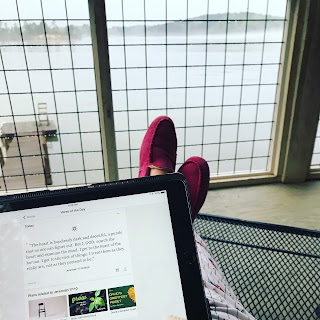
I've invented a new term - a new niche, if you will - for life coaching. The niche is called Pandemic Leadership. I'm pretty sure I'll make a fortune. Then again, maybe not, because it's possible that the ones who are in need don't know it.
Some things to consider:
- Are you responsible for a group, a team, an office? Are you a supervisor, executive, manager?
- As such, do people rely on you to lead, guide and direct their work, performance, or production?
- Is your normal leadership style distinctly hands-off or very involved? (It may be more in the middle but how does it look to your team?_
- Are you engaging with your team regularly?
- Are you feeling uncertain as to what to do?
- Are you feeling anxious yourself working from home and possibly with children/spouses there?
- Are you worried about funding, the future, your job, your team members' jobs?
- Are your supervisors communicating with you?
- Do you feel reluctant to engage lest you make a promise you can't keep or because you don't have a clue what to say?
Any of these could be reason enough to examine where you fall in the realm of Pandemic Leadership.
Let me quickly reassure you that up until now you've done what you know to do. Whatever you (or others) may sense is lacking, you've done what you know to do and that's been the best you had to offer at the time. Just because someone else might have "done it better" or thinks you could have, doesn't mean you didn't give your best. The question is: can you/should you do more and if so, what?
Pandemic by definition means prevalent over a whole country or world. That's a lot to ponder. And it's a heavy weight for your team, too. You may not be able to affect the whole world but you can impact your team and that can have a ripple effect that can positively impact your organization and the people in it. If you can improve your small corner of the world, shouldn't you? Odds are your team needs you and is looking to you to show them the way through this uncharted territory.
Here are some very simple things that you can do to get started.
- Put people over profits. People are your most valuable asset - and they can tell when you're thinking of them or when you're more worried about the bottom line (or yourself). Whether it's your team or your customers, it's incredibly valuable to put your energy into the people and what they need. Most need reassurance that you simply care.
- Communicate in a meaningful way. In other words, show you care. Consider what speaks to them most. Is it time, or words of affirmation, a gift of some sort? A simple thank you card can hit many of these. Even a personal text can mean a lot. Broad messages of support, encouragement and the organizations ability to move through the pandemic to greener pastures are also essential. People need to be reassured!
- Communicate regularly. And I don't mean to check up on their work. Send out team emails - daily. Find things to share with them that are encouraging. They need to hear from you even if it seems silly. Set up individual calls and encourage supervisors under you to do the same. Have team meetings weekly, even if all you do is just hang out. This is the new way to open your office door. Your people need to see and hear you.
- Be transparent. I cannot stress this more. Yes, I can. BE TRANSPARENT !!! There. It is not a weak posture to admit that you feel uncertain or that you're learning how to manage the work, team, customers in this new situation. When you let your team know that you aren't working a perfect 9-5 day and that you've had to make adjustments to your workday, you give them permission to do the same. When you are willing to hold telemeetings with kids running around, they won't worry so much about their spouse walking through the room (just make sure they've got their pants on).
- Be involved (but don't micromanage). Not sure there's much more to say. You've got to free your team to work on their own, but you still need to be involved. I encourage checking in now and again, see if they are clear on what they can be doing, free them from unnecessary tasks, respond to their emails and texts.
- Reduce your expectations. You have to understand that your employees/team are in an imperfect, new environment for work - and they probably have kids, animals and spouses to contend with as they attempt to work. Most likely, they are not sitting at a desk in a private office. They might be using their bed for their desk. Be okay with a different output than normal. It's expected. Allow them to work when it's best for them as long as they're reasonably available when needed and respond in a timely way.
- Listen for clues that your team needs help. Read between the lines. Are they quiet? Are they trying to clue you in to something? Are they using words like bored, lonely, tired? These can be indicators that you need to engage personally. Make a phone call. Set up a facetime coffee chat.
 The heart of this is really one thing and it goes back to the first thing. People over profits. That's not to say the profits don't matter. Of course they matter. But, taking care of the people will ultimately help you take care of the profits (or the program you're managing). You are your team's leader. You don't have to be the CEO to be the leader. You might be an executive or you might be a middle manager - it doesn't matter. Your leaders may be dropping the ball, but you don't have to. During this pandemic, true leaders will rise to the occasion and make sure their team feels supported and cared for. This will take intention and may require more creativity than what you've done in the past. And when we all get "back to normal" or our new normal, your team will thank you and I believe your organization and leadership will be stronger than ever.
The heart of this is really one thing and it goes back to the first thing. People over profits. That's not to say the profits don't matter. Of course they matter. But, taking care of the people will ultimately help you take care of the profits (or the program you're managing). You are your team's leader. You don't have to be the CEO to be the leader. You might be an executive or you might be a middle manager - it doesn't matter. Your leaders may be dropping the ball, but you don't have to. During this pandemic, true leaders will rise to the occasion and make sure their team feels supported and cared for. This will take intention and may require more creativity than what you've done in the past. And when we all get "back to normal" or our new normal, your team will thank you and I believe your organization and leadership will be stronger than ever.









